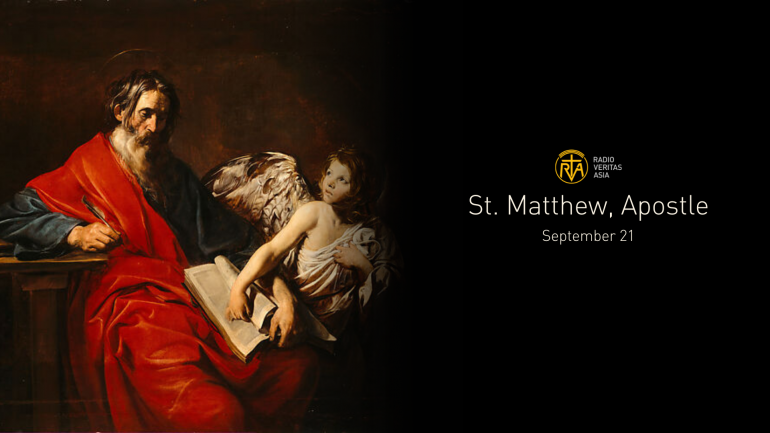St. Matthew, the patron saint of accountants

Saint Matthew, also known as Saint Matthew the Evangelist, Apostle, or Levi, was one of Jesus Christ's Twelve Apostles and wrote the first Synoptic Gospel. He was from Palestine in the first century CE.
His feast day is September 21 in the West and November 16 in the East. According to Matthew 9:9 and Mark 2:14, Jesus called Matthew into his presence when he was sitting by the customs house in Capernaum, near Almagor on the Sea of Galilee.
Since Mark calls Levi "the son of Alphaeus," Matthew, which means "Yahweh's Gift," may be Levi's Christian name. Levi collected taxes for Galilean tetrarch Herod Antipas. Levi's profession was suspicious and despised, therefore the Pharisees' scribes criticized Jesus for eating with tax collectors and sinners. To their criticism, Jesus said, "I came not to call the righteous, but sinners" (Mark 2:15–17).
According to Luke 5:29, Levi served the aforementioned supper in his home after receiving his summons. The New Testament provides minimal and ambiguous information on Matthew other than including him in the list of apostles, generally next to St. Thomas.
The Gospel, according to Matthew, was undoubtedly written for a Jewish-Christian church in a strongly Jewish environment, but whether Matthew is unquestionably the synoptic author is seriously questioned. Outside of the New Testament, a statement of importance about him is the passage from the Apostolic Father Papias of Hierapolis preserved by Bishop Eusebius of Caesarea: "So then Matthew composed the Oracles in the Hebrew language, and each one interpreted them as he could.
According to tradition, he first served in Judaea before purportedly going on a mission to the East, maybe to Ethiopia or Persia. It is unclear from the legend whether he passed away naturally, as a martyr, or where his missions took him. Matthew's artifacts were found near Salerno, Italy, around 1080. He is the patron saint of accountants and tax collectors, and his emblem is an angel. Matthew narrates a narrative of how Jesus asked him to follow him and how the Jewish people felt about tax collectors in Chapter 9 of his Gospel.
It is found in Matthew 9:9–13. Jesus understood in his heart that Matthew was neither a sinner nor a fraud. In this narrative, the Pharisees, a group of Jews who scrupulously observed all the commandments of their religion, refer to tax collectors as "sinners. Jewish people who had converted to Christianity were the target audience for Matthew's gospel.
He wished for his listeners to understand that Jesus was the prophesied Messiah whom God would bring to redeem all mankind. It is abundantly obvious from Matthew's Gospel that Jesus is the Old Testament prophets' whole line of prophecy. The eight beatitudes are exclusively shared by Matthew with his audience, making him the only evangelist to do so. The attitudes and behaviors necessary for individuals who uphold the new law Jesus came to deliver are accurately portrayed by Jesus in His Gospel, along with who will be really rewarded by God in the Kingdom.
As Jesus had instructed his followers to do, Matthew proclaimed the gospel upon his ascension. He is thought to have started Christian communities in Ethiopia and other regions of the African continent. Tradition claims that he passed away as a martyr. A figure with wings serves as the representation of Matthew's gospel. It is abundantly obvious from Matthew's Gospel and the writings he made concerning Jesus' Incarnation that He was indeed both God and truly man.
Being a tax collector, Matthew dealt with money, making him the patron saint of bankers. But everybody who has read Matthew's Gospel knows that he didn't value money. Belief in and adherence to the teachings of Christ were what mattered. Matthew serves as a reminder that our trust in Jesus is what gives us our true wealth.
Radio Veritas Asia (RVA), a media platform of the Catholic Church, aims to share Christ. RVA started in 1969 as a continental Catholic radio station to serve Asian countries in their respective local language, thus earning the tag “the Voice of Asian Christianity.” Responding to the emerging context, RVA embraced media platforms to connect with the global Asian audience via its 21 language websites and various social media platforms.











